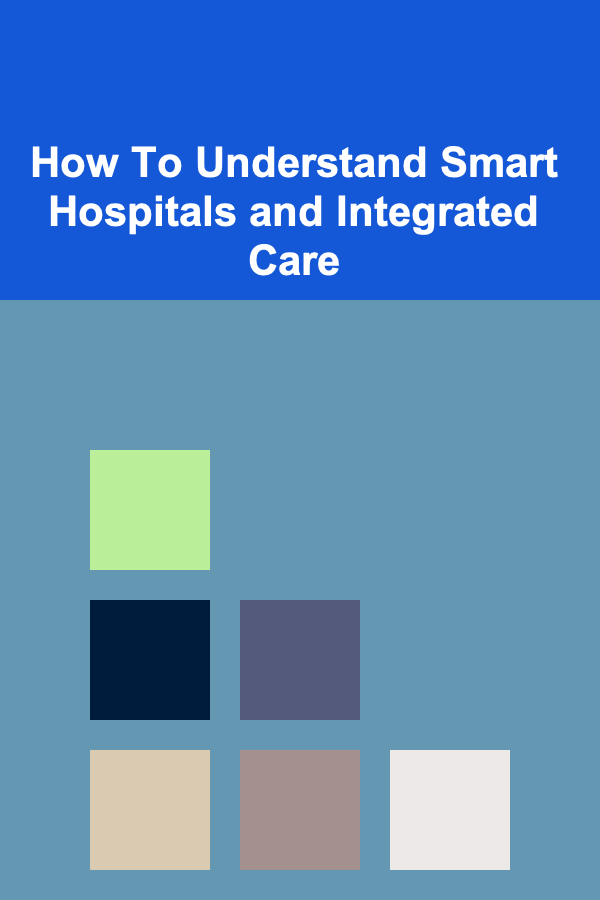
How To Understand Smart Hospitals and Integrated Care
ebook include PDF & Audio bundle (Micro Guide)
$12.99$7.99
Limited Time Offer! Order within the next:

In recent years, the healthcare sector has been undergoing a transformation, largely driven by advances in technology and a growing focus on patient-centered care. Among the most significant changes in modern healthcare systems are the emergence of "smart hospitals" and the growing adoption of "integrated care." While these concepts are distinct, they are increasingly interconnected, and together they represent a paradigm shift in how healthcare is delivered and experienced. Understanding smart hospitals and integrated care is crucial for anyone involved in healthcare management, policy-making, or patient advocacy. This article explores these two concepts, how they interrelate, and their potential to revolutionize the healthcare landscape.
What Are Smart Hospitals?
A smart hospital is a medical facility that leverages digital technologies, data analytics, and innovative devices to improve the quality of care, enhance operational efficiency, and provide better patient outcomes. The integration of technology into hospitals is not a new concept, but the development of "smart" capabilities has brought these technologies to a new level, making hospitals more connected, intelligent, and responsive.
Key Characteristics of Smart Hospitals
- Interconnected Systems: Smart hospitals use interconnected systems, where devices, medical equipment, and patient records are all integrated into a central network. This enables healthcare professionals to access real-time data and make informed decisions.
- Data-Driven Decision Making: Smart hospitals use data analytics to monitor patient health and hospital operations. By collecting and analyzing vast amounts of data from various sources such as electronic health records (EHRs), wearable devices, and medical sensors, hospitals can predict potential health issues, optimize resource allocation, and improve clinical outcomes.
- Automation: Automation in smart hospitals includes everything from administrative tasks like scheduling and billing to clinical procedures such as surgery or medication dispensing. Robots and artificial intelligence (AI) are commonly used to assist with routine tasks, allowing healthcare providers to focus on more complex aspects of patient care.
- Personalized Patient Care: By analyzing data from wearables and monitoring devices, smart hospitals can deliver highly personalized care. These systems monitor vital signs, track patient progress, and notify medical staff of any changes in real-time, enabling early interventions and more accurate treatment plans.
- Telemedicine: The integration of telemedicine into smart hospitals allows for remote consultations with specialists and healthcare providers. Patients can receive care from the comfort of their homes, reducing the need for in-person visits and minimizing the risk of infection.
Benefits of Smart Hospitals
- Improved Patient Safety: Real-time monitoring, predictive analytics, and AI-driven decision-making contribute to better patient safety by alerting clinicians to potential problems before they become critical.
- Enhanced Efficiency: With streamlined processes, reduced paperwork, and more accurate data, hospitals can deliver care more efficiently, reducing wait times, improving resource management, and lowering operational costs.
- Better Patient Experience: With features such as remote consultations, personalized care plans, and real-time updates, patients benefit from a more convenient, responsive, and tailored healthcare experience.
What Is Integrated Care?
Integrated care refers to the coordination of healthcare services across different levels and sectors to provide comprehensive, continuous care that is centered on the needs of the patient. The primary goal of integrated care is to ensure that patients receive the right care at the right time, reducing fragmentation and improving overall health outcomes.
Integrated care involves not only healthcare providers but also patients, families, and caregivers. The focus is on holistic care, addressing not just the physical aspects of a patient's health but also their mental, social, and emotional well-being.
Key Components of Integrated Care
- Coordination Across Providers: Integrated care involves seamless communication and collaboration among different healthcare providers, including primary care physicians, specialists, hospitals, and rehabilitation centers. This coordination ensures that each provider is aware of the patient's condition and treatment plan, reducing duplication of services and preventing gaps in care.
- Patient-Centered Approach: The core of integrated care is the patient. Care is personalized to meet the individual needs and preferences of the patient, considering factors like cultural background, social determinants of health, and personal circumstances.
- Multidisciplinary Teams: Integrated care often involves a team of healthcare professionals from various disciplines, including physicians, nurses, therapists, dietitians, and social workers. These teams work together to create a comprehensive care plan that addresses all aspects of the patient's health.
- Continuity of Care: One of the challenges in traditional healthcare systems is the discontinuity of care as patients move between different providers or settings. Integrated care ensures that there is continuity, so patients don't experience disruptions or delays in their treatment. This is particularly important for patients with chronic conditions who require long-term care.
- Technology Integration: Technology plays a vital role in integrated care by enabling the sharing of patient information across different healthcare settings. Electronic health records (EHRs), for example, ensure that every healthcare provider has access to the latest patient data, reducing errors and improving the overall quality of care.
Benefits of Integrated Care
- Improved Health Outcomes: By coordinating care across different providers, integrated care ensures that patients receive the most effective treatment for their specific conditions, leading to better overall health outcomes.
- Cost Savings: Integrated care can reduce unnecessary hospital admissions, avoid duplication of services, and lower the costs associated with fragmented care, ultimately leading to more cost-effective healthcare delivery.
- Better Patient Experience: Patients benefit from a more cohesive and streamlined healthcare experience, with better communication, fewer appointments, and more personalized care.
The Intersection of Smart Hospitals and Integrated Care
While both smart hospitals and integrated care focus on improving healthcare delivery, they operate at different levels. Smart hospitals focus primarily on leveraging technology and data to improve patient care within a specific hospital, while integrated care aims to coordinate and connect care across the broader healthcare system, ensuring continuity and holistic management.
However, these two concepts are becoming increasingly intertwined. In fact, smart hospitals can enhance integrated care, and integrated care principles can guide the implementation of smart hospital technologies.
How Smart Hospitals Enhance Integrated Care
- Real-Time Data Sharing: Smart hospitals enable the sharing of real-time patient data across different healthcare providers, creating a more integrated system. For instance, if a patient is admitted to a hospital, their primary care physician, specialists, and even community health workers can access their health data, ensuring that everyone involved in their care is on the same page.
- Telemedicine and Remote Monitoring: Smart hospitals make use of telemedicine and remote monitoring devices, which are key components of integrated care. Through these technologies, patients can receive care from various providers without needing to visit multiple locations. This ensures continuity of care, particularly for patients with chronic conditions.
- Personalized Treatment Plans: Smart hospitals, with their data analytics capabilities, can assist healthcare providers in creating highly personalized treatment plans for patients. By analyzing patient history, genetics, and real-time health data, healthcare providers can tailor care plans to each individual, which is a key principle of integrated care.
- Enhanced Communication and Collaboration: The use of collaborative platforms and communication tools in smart hospitals ensures that multidisciplinary teams involved in patient care can easily share information, discuss treatment options, and make collective decisions. This collaboration is central to integrated care.
How Integrated Care Facilitates the Adoption of Smart Hospital Technologies
- Patient-Centered Design: Integrated care places a strong emphasis on the patient experience and holistic care. This patient-centered approach can drive the adoption of smart hospital technologies that aim to improve patient satisfaction, such as telemedicine platforms, wearable devices, and personalized health apps.
- Coordinated Implementation: Integrated care models require a coordinated effort between multiple healthcare providers. Smart hospital technologies that facilitate communication, such as EHRs and cloud-based platforms, are essential for ensuring that all providers involved in the patient's care are aligned in their treatment approach.
- Holistic Care Management: Integrated care requires that all aspects of a patient's health are considered, including physical, emotional, and social factors. Smart hospital technologies, such as AI-driven tools that analyze data from various sources, can help provide a more comprehensive view of a patient's health, supporting the delivery of more holistic care.
The Future of Smart Hospitals and Integrated Care
As technology continues to advance and the demand for more efficient, patient-centered care grows, the future of smart hospitals and integrated care looks promising. With the continued integration of AI, machine learning, the Internet of Things (IoT), and telemedicine, healthcare systems are poised to become more connected, efficient, and responsive to the needs of patients.
Moreover, the COVID-19 pandemic has accelerated the adoption of digital health technologies, and many of the innovations in telemedicine, remote monitoring, and data analytics are likely to remain integral to healthcare systems moving forward. This will further enhance the potential of smart hospitals and integrated care, creating a more seamless, effective, and compassionate healthcare system.
Conclusion
Smart hospitals and integrated care are two concepts that are reshaping the healthcare industry, each contributing to the enhancement of patient outcomes and the improvement of healthcare delivery. While smart hospitals focus on utilizing advanced technologies and data-driven decision-making to enhance care within the hospital, integrated care aims to provide holistic, coordinated care across the entire healthcare system. Together, these approaches promise to create a more efficient, personalized, and patient-centered healthcare system that benefits patients, healthcare providers, and the broader community. Understanding these concepts and their interrelationship is essential for anyone invested in the future of healthcare.

Essential Used Car Buying Tips to Help You Find the Best Deal
Read More
How to Improve Your Home Security During a Renovation
Read More
The Administrative Assistant's Guide to Efficiency and Organization
Read More
How to Understand Climate Justice and Equity
Read More
How To Learn to Arrange Music for Ensembles
Read More
How To Build APIs (Application Programming Interfaces)
Read MoreOther Products

Essential Used Car Buying Tips to Help You Find the Best Deal
Read More
How to Improve Your Home Security During a Renovation
Read More
The Administrative Assistant's Guide to Efficiency and Organization
Read More
How to Understand Climate Justice and Equity
Read More
How To Learn to Arrange Music for Ensembles
Read More